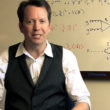Is Sean Carroll Correct That the Universe Moves By Itself?
by Brandon Vogt
Filed under Atheism, Christianity and Science, Cosmology

Many theists, including myself, believe that some of the strongest arguments for God rely on the logical need for a First Cause of the universe (or First Mover, depending on which argument you use.) This sort of argument goes back at least to Aristotle, who thousands of years ago suggested that, "Everything that is in motion must be moved by something" (and by motion he meant any change whatsoever, not just locomotion, or spatial change). However, physicist Sean Carroll thinks Aristotle... Read More
Why Must the First Cause Still Be With Us Today?
by Strange Notions
Filed under The Existence of God

NOTE: Today we continue an occasional series of exchanges between Catholic theologian Dr. Michael Augros, author of Who Designed the Designer?: A Rediscovered Path to God's Existence (Ignatius Press, 2015), and various email interlocutors. Today's exchange follows up on last week's, so be sure to read those two posts first. We'll share the second email question today and Friday we'll share Dr. Augros' response. Enjoy! Hello Dr. Augros, Thank you for the time and effort you... Read More
Should We Be Skeptical About Needing a First Cause?
by Strange Notions
Filed under The Existence of God

NOTE: Today we kick off an occasional series of exchanges between Catholic theologian Dr. Michael Augros, author of Who Designed the Designer?: A Rediscovered Path to God's Existence (Ignatius Press, 2015), and various email interlocutors. We'll start with the first email question today and Friday we'll share Dr. Augros' response. Enjoy! Hello Dr. Augros, I am a devout Catholic who recently purchased your book, Who Designed the Designer? I just finished the first chapter... Read More
It’s That Simple: The First Cause and Occam’s Razor
by Steven Dillon
Filed under The Existence of God

One objection to First Cause arguments is that they make superfluous attributions: surely in any steady hand Occam’s razor would deliver a much more modest looking First Cause than God. In my last post, I argued that this objection is fallacious in as much as it begs the question against Classical Theism, for which the First Cause and its attributions are indivisible (and thus hardly capable of being whittled by Occam). But, this doesn’t show that there is a First Cause, or that Classical... Read More
In Defense of Classical Theism
by Steven Dillon
Filed under The Existence of God

When I first began to study the philosophy of religion, I became acquainted with a certain style of reasoning about God. This style seems to model arguments for and against God after arguments in the natural sciences, and is very much in vogue today. Herman Philipse is representative when he says that "the methodological dilemma for natural theologians in contemporary Western culture is that they either have to opt for methods of factual research that are intellectually respectable in... Read More
Why God is the Ground of Objective Morality
by Joe Heschmeyer
Filed under Objective Morality

EDITOR'S NOTE: Today continues our eight-part debate on the resolution, "Does objective morality depend on the existence of God?" We'll hear from two sharp young thinkers. Joe Heschmeyer, a Catholic seminarian in Kansas City, Kansas, will argue the affirmative view. Steven Dillon, a gifted philosopher and a former Catholic seminarian, will argue the negative. The eight parts will run as follows: Monday (11/4) - Joe's opening statement (affirmative) Tuesday (11/5) - Steven's opening statement... Read More
A First Without a Second: Understanding Divine Causality
by Dr. Edward Feser
Filed under The Existence of God

NOTE: Dr. Feser's contributions at Strange Notions were originally posted on his own blog, and therefore lose some of their context when reprinted here. Dr. Feser explains why that matters. For the Thomist, to say that God is the First Cause of things is, first and foremost, to say that He is the cause of their existence at every moment at which they do exist. God creates things out of nothing precisely in the act of conserving them in being, and apart from His continual... Read More
Legos, God, and the Fallacy of Composition
by Dr. Edward Feser
Filed under The Existence of God

NOTE: Dr. Feser's contributions at Strange Notions were originally posted on his own blog, and therefore lose some of their context when reprinted here. Dr. Feser explains why that matters. Both critics and defenders of arguments for the existence of God as an Uncaused Cause often assume that such arguments are essentially concerned to explain the universe considered as a whole. That is true of some versions, but not all. For instance, it is not true of Aquinas’s arguments,... Read More






